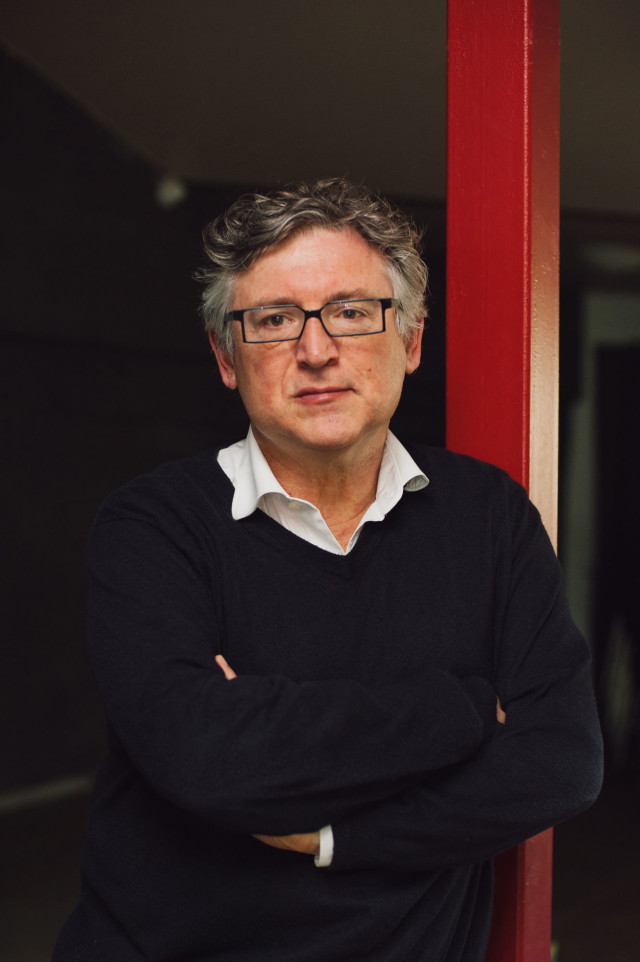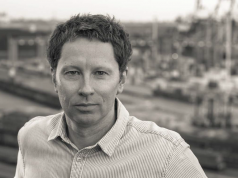It is a commonly assumed axiom that the French public loves nothing more than an adroit intellectual duel. Over the past year, attention has focused on the ongoing confrontation between French philosophical heavyweights Bernard-Henri Lévy and Michel Onfray, who are currently clashing over a range of existential issues ranging from the status of French Muslims to Maidan. Onfray recently opened a new front line in the campaign when he appeared in Odessa as part of the annual French Spring cultural festival. The Odessa Review attended to see what he had to say about Ukraine’s revolution, hedonism, separation of church and state, Putin’s hybrid war, and France’s role in the modern world.
On April 23rd, the renowned French philosopher Michel Onfray gave a public lecture in Odessa at the Terminal 42 co-working space. Born to a family of Norman farmers, Onfray is now one of the best known, and certainly most popular, philosophers in France. A self described ‘pragmatic anarchist’, he has set up a tuition free university, taught outside of the traditional university system and he routinely sells millions of books. A latter day disciple of the work of Michel Foucault, his thought draws on a wide variety of sources: idealism, French materialism, spiritualism, Kantianism, individualist hedonism, eastern philosophy and anarchism. Having published over a hundred books, he also somehow finds the time that required for his political activism and continuous television appearances.
The anchoring subject of the talk was a recently published book that had just been translated into Ukrainian. The event was structured as a conversation between himself and his translator, and included customary references to Georges Bataille, Marquis de Sade and Sarte. Onfray’s bespoke admixture French materialism and liberationist anarchism offered a categorical mélange of categories from which he had cobbled together a taxonomy of radical individualism. He nimbly elided and roamed between ideas and concepts in a free associative and discursive style which will be familiar to anyone who has spent any amount of time reading contemporary French theory. He also devoted a portion of the discussion to speaking about the legacy of Georges Palante, a little known, proto – existentialist, “left- Nietczchian”, of whose notion of ‘social atheism’ Onfray had encouraged a revival.
Onfray is also well known for his commitment to the idea of hedonism, as well as his interest in the history of the Epicurean school of thought. During his appearance he explained the distinction he sees between ‘vulgar’ hedonism and the ‘authentic’ variant. Afterward, an earnest student from the audience inquired of what he meant exactly with his usage of the word ‘hedonist’, explaining that in Ukraine the concept had negative connotations and that a hedonist was actually a mirror image of the anti-social ‘marginal’, and so something of a social parasite. ‘What is your position and what is the program you are advocating?’’ reiterated the young man.
Onfray responded to the question by proffering a slightly more expanded definition of philosophical hedonism. The concept did not turn out to be very complex. The vulgar kind of hedonism was a form of consumerism, which included buying art if one did not understand it, owning an expensive car or having a very big house. As an example, he postulated Chinese mafiosi and Russian oligarchs buying their way through Europe with avaricious consumerist tastes.
Vulgar hedonism is always connected to the desire FOR objects’ and the sort of hedonism that Onfray practiced was rooted in the partaking in the simpler things in life
‘Vulgar hedonism is always connected to the desire for objects’ and the sort of hedonism that Onfray practiced was rooted in the partaking in the simpler things in life. Authentic philosophical hedonism, the philosopher informed included sitting with a beautiful girl in a park and looking at her smile, taking pleasure in the sunlight (Which however ironically, is a definition which is somewhat more puritanical than Epicurean).
A local academic philosopher in his late fifties, who identified himself to the audience as a professor of religious studies (he humorously underlined that he had once taught the same class in the Atheism studies department) explained slyly to Onfray that he had just finished reading the book and that he was surprised that book on the theme of hedonism and atheism barely mentioned the name of Karl Marx and inquired why this was so. Onfray responded to the question with a fluent recital of the traditional position of Feurbach’s thesis in the history of scientific atheism, but for the most part he and the professor seemed to be speaking past each other. In the middle of a former Soviet city, he did not explain why he had written a book about ‘social atheism’ while avoiding mentioning the historical context that the local philosopher had grown up with.
The evening did not end without overt controversy however. Bruce Leimisdor, professor of immigration and asylum Law at Ca’ Foscari University in Venice, who is currently a guest professor at the Odessa Law Academy, and who resides in Paris, offered a criticism of the philosopher’s dichotomy between atheism and religion. This was done, he explained, in view of the urgent social and legal situation in France caused by religiously inspired terrorism. Such a dichotomy avoids the institution of laïcité. Specifically, this was a response to the Onfray’s assertions that there exist no substantial differences between Christianity, Judaism and Islam, Leimisdor brought up the issue of laïcité and what he asserted was its rejection by Islam. Islam’s inability to accept secularism and the separation of religion and state becomes an issue of acute importance. Laïcité, it should be noted, remains a semi sacred principle in France. Leimisdor pointed out that it is defended even by the most pious French Catholics and French Jews, and is the key question facing integration of Muslims in France today. In this reading, failure of any organized religion to accept laïcité opens the door to politicization of religion and thus to religiously based violence.
To that question, Mr. Onfray seemed to have no answer. His response was to deflect the question by giving a long discourse on the history of religious violence in the West. He also went on to point out, with questionable relevance to the discourse at hand, the distinction between ethnic and universal religions. Judaism for him was from the very beginning a nationalist religion, thus a theocracy, but one that he underlined, had had no imperialist orientation in it’s classical form. Onfray further maintained that there was not one Islam, but many to speak of, with the implication that to discuss the matter was to carry on the risk of making essentialist and generalized statements. Mr. Onfray also directed the question about the terrorist situation in France and the place of Laïcité inexplicably into a discussion of the difference between ‘diasporic Judaism’ and the Judaism practiced in Israel.
This was an odd direction to take as Leimisidor’s posed a very specific and very contemporary question concerning the political and cultural situation in Europe, in the midst of organized political violence, and included no referent whatsoever to the history of comparative religion, or contemporary politics in the Middle East. Circling the issue, Onfray nonetheless acknowledged that he believed that from a private point of view, Muslims could accept laïcité, but it would become impossible when it became transformed into a political project. Under such circumstances, Islam would become a theocracy. He defended Islam in a roundabout way by saying that there are some Muslims who accept laïcité, but that no claim could be made of the acceptance of laïcité by major schools of Islam. It looked like he wanted to avoid any criticism of Islam and viewed such arguments as specious, a possible neo- colonialist manifestation of French chauvinism against its Muslim minorities.
In any case, Onfray maintained that any assertions of French liberalism would be, according to his worldview, entirely false. The Catholic Church, he ventured, still hold’s a prominent position in French society and it does not accept laïcité. He claimed that the church had never really been tamed in France until very recent times, and still plays an outsized part in French public life. From this argument follows the insinuation that there is no real republican separation of church and state in France, merely a veil for religious rule held by the religion of the native majority.
Leimisidor’s response to this point was that this was a completely false argument: When, two years ago, France was voting on institutionalizing same sex marriage, no amount of fervent protestation by the Catholic Church in France has any sort of impact on the debate or its outcome. This sort of respect for republican values is encoded in the DNA of the French nation.
Only the best-prepared Ukrainian philosophy students would have gotten very much out of the presentation of his ideas and the ensuing debate
No satisfactory denouement to the argument ever came. Onfray’s answers to hard questions were evasive. The audience would be forgiven for being flummoxed by the hybrid interview/debate that it had just witnessed. Onfray made very little allowance for the local context or the grounding capacity needed to understand his philosophical language and positions. The final result was neither a rigorous lesson in philosophical method nor a sustained inquiry into a single issue, but rather a fairly per-functionary summary of a series of positions and themes he has developed over his three decade’s long career. He had come to discuss materialism in a country that had seen a 70% currency collapse in two years.
Well understood by many in France, only the best-prepared Ukrainian philosophy students would have gotten very much out of the presentation of his ideas and the ensuing debate. Onfray seemed to be mechanically repeating things that he had been saying for years, without relying too much on a technical armature and did not do much to demonstrate the logical connections between his positions. He seemed to be directing his commentary at people who already agreed with his positions apriori. Other than offering a rare opportunity for Odessan students to observe a particularly rare bird of paradise in flight, the afternoon was disappointing in that it represented a lost opportunity for a more stimulating and thorough engagement.
The interview that follows this essay was conducted by the French novelist Sophie Schulze. The special interest of her intervention for a Ukrainian audience must surely lie with her questioning Onfray on his views on the conflict between Russia and Ukraine, as well as his opinion of the political commitments of fellow French philosopher Bernard-Henri Lévy.
Last autumn, the French intellectual world was shaken by the frenetic public duel between the two philosophers. Onfray considers Lévy’s liberal interventionism and his steering of France into taking military action in Libya, to have been a catastrophic and deadly mistake. He is also generally disdainful of Lévy’s other political commitments. These include Lévy’s stolid, unremitting and committed defense of Ukraine’s territorial integrity and place in the European order. Lévy’s muscular liberalism has been fully on the side of Ukraine’s right to make its own decisions on which direction to take. Lévy has made half a dozen trips to Ukraine over the last two years, spoken at the Maidan and performed his play Hotel Europa in Odessa, Kyiv and Lviv.
Onfray is a committed ‘anti-Imperialist’ of a particular leftist French school of anti-Americanism which calls for Ukraine to take a non – aligned ‘third way’ between Russia and Europe. He is skeptical of what he perceives as a hegemonic Western narrative about the conflict. This is a position that is genealogically descended from anti-colonial Third-Worldism. In this interview, Onfray proclaims himself to be against what he perceives to be the authoritarianism of Russian president Putin, but also claims that the issues surrounding de-Communization and the annexation of the Crimean peninsula are ‘complicated’. Onfray reminds us that his position is reminiscent of the principled refusal to take the side of either the Soviet Union or the United States by people like Albert Camus – himself a noted philosopher hedonist – at the height of the cold war. Camus is of course the figure who charted a middle course between Raymond Aron (‘since I must choose, I will choose the United States’’) and the Soviet Union supporting existentialist Jean-Paul Sartre.
Lévy on the other hand is the author of ‘Left in Dark Times: A Stand Against the New Barbarism’, a book in which he charts the dark relationship between the anti-liberal, anti-Western, anti-American and anti-Semitic opinions held by large portions of the French left. He is clearly the liberal Raymond Aron in this story (though this is clearly a reductionist analogy; students of French intellectual history will know that relations between Aron and the young Lévy were complex). Onfray’s answer to the question of whether Lévy is correct in his proclamations that Ukraine is Europe is a resounding ‘No’. For him ‘this is the American thesis, and it represents an Americanized Ukraine of improvisation and McDonalds’. It should be obvious to any right thinking person that any idea or argument shared by Americans is surely malevolent and wrong. This answer evokes the ‘buffer zone’ arguments of those who advance the great power ‘spheres of influence’ thesis, and Onfray must surely understand that his position is very welcome in the Kremlin. It is ironic that Onfray, a man of self-described ‘anti–imperialist’ sympathies, would resort to the arguments of resurgent neo- cold war rhetoric in his opposition to the new cold war between Russia and the West. Whether Onfray will be vindicated as a farsighted and sagacious modern Camus, or recalled as a well-meaning, but ultimately complicit fellow traveling Jean-Paul Sartre, is up to history – and the reader to decide.




































